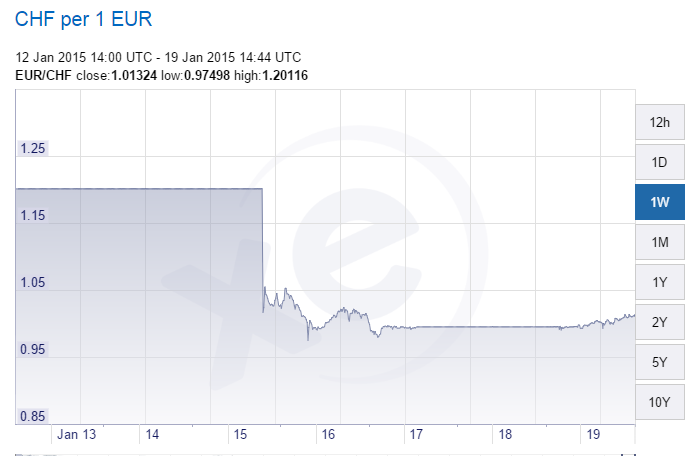
Last Thursday, the Swiss National Bank (“SNB”) dropped interest rates to NEGATIVE 0.75% and removed the peg to the Euro at 1.20 resulting in the Swiss Franc appreciating at one point by nearly 30% against the Euro. In a currency peg, a central bank is essentially promising that it will buy or sell its own currency to maintain its value fixed versus another currency.
The surprise move by the Swiss Central Bank to remove the currency ceiling against the euro had dramatic implications and hit many Foreign Exchange brokers hard. Many Foreign Exchange firms suffered substantial losses. The CHF/Euro exchange rate plummeted from around the 1.20 mark to as low as 0.79. Many customer accounts of these firms will be in deep negative equity and the inevitable knock-on effects have yet to be seen.

The peg worked by retaining the value of the Swiss franc pegged to the euro but the euro had been losing value in the last few months. So many traders reasoned that as long as the euro kept falling and the peg was intact, they could bet that the Swiss franc would also fall against other currencies. But with the euro under severe pressure, this was a hugely expensive exercise for the Swiss Central Bank to maintain and central banks don’t like losing money.
Today, the EUR/CHF currency exchange rate is 1.01 euro’s to the Swiss Franc after a reversal since the shock decision left many traders in the Swiss Franc nursing huge losses and a good number unable to meet margin calls on positions sometimes leveraged 500 to 1 and trading on the basis of single pips. Some brokers were facing closure as the losses endured by customers appeared too great to recoup. West Ham FC sponsor Alpari UK is now in severe financial distress, Global Brokers in New Zealand was forced to close down and FXCM in New York had to be bailed out with $300 million from Jefferies owner Leucadia whilst Barclays, Deutsche Bank and IG Group lost millions. In the case of IG reports of around £30 million and FXCM lost $225 million! Today Alpari said that contrary to its previous announcements, its UK business “has not entered a formal insolvency process” and “The board of directors are urgently considering all options including a sale and are liaising closely with the FCA. We hope to make a further announcement shortly,”.
The Swiss move caused extreme volatility in the market with a sudden loss of buying liquidity causing an avalance of stop losses to be triggered resulting in even more selling. Before traders knew it their profitable positions were hugely under water with brokers desperately calling in margin. Historically traders in the Swiss Franc have used the relative safety and reliability of the currency to make big bets on minor currency changes. These big bets ultimately came back to haunt them as Forex dealers failed to realise the risk to their businesses from these days. Who would have thought that a major currency like the Swiss Franc could move so dramatically against the euro and dollar in a matter of minutes.
Here’s something very interesting that people who don’t use FXCM probably don’t know. Twice a day, FXCM publishes something called the Speculative Sentiment Index which shows what percentage of their traders are holding long positions and which percentage are holding short. The advice offered by FXCM is that you always trade against the majority. Leading up to the event, FXCM traders were overwhelmingly short the CHF. I quote from the information offered a few hours before the event:
USDCHF – The ratio of long to short positions in the USDCHF stands at 1.56 as 61% of traders are long….We use our SSI as a contrarian indicator to price action, and the fact that the majority of traders are long gives signal that the USDCHF may continue lower.
EURCHF – The ratio of long to short positions in the EURCHF stands at 67.34 as 99% of traders are long…We use our SSI as a contrarian indicator to price action, and the fact that the majority of traders are long gives signal that the EURCHF may continue lower.
Both those crosses certainly did continue lower 🙂 Funny how the consensus always gets it wrong! Contarian strategies can work great but sometimes you need incredibly deep pockets to stay in the game when you’re on the losing side, possibly for months or longer. Take mean reversion, things always revert to the mean. It’s just a shame you never know what the mean is going to be.
Bloomberg: “There was a good hour when euro-swiss was untradeable,” said Chris Morrison, London-based head of strategy at Omni Macro Fund, a hedge fund which oversees $550 million. ‘Clearly there was no liquidity.’
There will be a lot of private Forex traders who will have learnt some painful lessons out there. Use guaranteed stop losses and don’t over leverage even in apparent “safe” trades! Some traders have had their accounts frozen as the financial turmoil has hit their brokers. Now the dust has settled, it may be time to revisit who they use to execute their trades. For now, calm has returned for those trading the Swiss Franc but it has been a costly trade on the whole. Not many anticipated the surprise Swiss move, though with quantiative easing beckoning in the eurozone with the benefit of hindsight, it would have been a tough challenge for the Swiss Central Bank to hold up the currency in the face of an onslaught of money printing.
Contrarian Investor UK
IMPORTANT: The posts I make are in no way meant as investment suggestions or recommendations to any visitors to the site. They are simply my views, personal reflections and analysis on the markets. Anyone who wishes to spread bet or buy stocks should rely on their own due diligence and common sense before placing any spread trade.
by contrarianuk
Forex traders still cursing Swiss Central Bank
Jan 19, 2015 at 3:07 pm in Market Commentary by contrarianuk
Last Thursday, the Swiss National Bank (“SNB”) dropped interest rates to NEGATIVE 0.75% and removed the peg to the Euro at 1.20 resulting in the Swiss Franc appreciating at one point by nearly 30% against the Euro. In a currency peg, a central bank is essentially promising that it will buy or sell its own currency to maintain its value fixed versus another currency.
The surprise move by the Swiss Central Bank to remove the currency ceiling against the euro had dramatic implications and hit many Foreign Exchange brokers hard. Many Foreign Exchange firms suffered substantial losses. The CHF/Euro exchange rate plummeted from around the 1.20 mark to as low as 0.79. Many customer accounts of these firms will be in deep negative equity and the inevitable knock-on effects have yet to be seen.
The peg worked by retaining the value of the Swiss franc pegged to the euro but the euro had been losing value in the last few months. So many traders reasoned that as long as the euro kept falling and the peg was intact, they could bet that the Swiss franc would also fall against other currencies. But with the euro under severe pressure, this was a hugely expensive exercise for the Swiss Central Bank to maintain and central banks don’t like losing money.
Today, the EUR/CHF currency exchange rate is 1.01 euro’s to the Swiss Franc after a reversal since the shock decision left many traders in the Swiss Franc nursing huge losses and a good number unable to meet margin calls on positions sometimes leveraged 500 to 1 and trading on the basis of single pips. Some brokers were facing closure as the losses endured by customers appeared too great to recoup. West Ham FC sponsor Alpari UK is now in severe financial distress, Global Brokers in New Zealand was forced to close down and FXCM in New York had to be bailed out with $300 million from Jefferies owner Leucadia whilst Barclays, Deutsche Bank and IG Group lost millions. In the case of IG reports of around £30 million and FXCM lost $225 million! Today Alpari said that contrary to its previous announcements, its UK business “has not entered a formal insolvency process” and “The board of directors are urgently considering all options including a sale and are liaising closely with the FCA. We hope to make a further announcement shortly,”.
The Swiss move caused extreme volatility in the market with a sudden loss of buying liquidity causing an avalance of stop losses to be triggered resulting in even more selling. Before traders knew it their profitable positions were hugely under water with brokers desperately calling in margin. Historically traders in the Swiss Franc have used the relative safety and reliability of the currency to make big bets on minor currency changes. These big bets ultimately came back to haunt them as Forex dealers failed to realise the risk to their businesses from these days. Who would have thought that a major currency like the Swiss Franc could move so dramatically against the euro and dollar in a matter of minutes.
Here’s something very interesting that people who don’t use FXCM probably don’t know. Twice a day, FXCM publishes something called the Speculative Sentiment Index which shows what percentage of their traders are holding long positions and which percentage are holding short. The advice offered by FXCM is that you always trade against the majority. Leading up to the event, FXCM traders were overwhelmingly short the CHF. I quote from the information offered a few hours before the event:
USDCHF – The ratio of long to short positions in the USDCHF stands at 1.56 as 61% of traders are long….We use our SSI as a contrarian indicator to price action, and the fact that the majority of traders are long gives signal that the USDCHF may continue lower.
EURCHF – The ratio of long to short positions in the EURCHF stands at 67.34 as 99% of traders are long…We use our SSI as a contrarian indicator to price action, and the fact that the majority of traders are long gives signal that the EURCHF may continue lower.
Both those crosses certainly did continue lower 🙂 Funny how the consensus always gets it wrong! Contarian strategies can work great but sometimes you need incredibly deep pockets to stay in the game when you’re on the losing side, possibly for months or longer. Take mean reversion, things always revert to the mean. It’s just a shame you never know what the mean is going to be.
Bloomberg: “There was a good hour when euro-swiss was untradeable,” said Chris Morrison, London-based head of strategy at Omni Macro Fund, a hedge fund which oversees $550 million. ‘Clearly there was no liquidity.’
There will be a lot of private Forex traders who will have learnt some painful lessons out there. Use guaranteed stop losses and don’t over leverage even in apparent “safe” trades! Some traders have had their accounts frozen as the financial turmoil has hit their brokers. Now the dust has settled, it may be time to revisit who they use to execute their trades. For now, calm has returned for those trading the Swiss Franc but it has been a costly trade on the whole. Not many anticipated the surprise Swiss move, though with quantiative easing beckoning in the eurozone with the benefit of hindsight, it would have been a tough challenge for the Swiss Central Bank to hold up the currency in the face of an onslaught of money printing.
Contrarian Investor UK
IMPORTANT: The posts I make are in no way meant as investment suggestions or recommendations to any visitors to the site. They are simply my views, personal reflections and analysis on the markets. Anyone who wishes to spread bet or buy stocks should rely on their own due diligence and common sense before placing any spread trade.